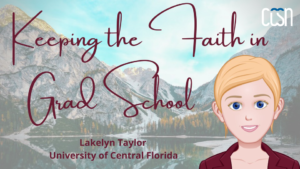Keeping the Faith in Grad School
Column Description: Writing as a Christian who is a doctoral student at a public institution of higher learning, Lakelyn reflects on how graduate students can maintain their faith in graduate school when it seems hard to do. This column is not about how to “beat” the “other” side in debates about religion or secular ideas. It is not a column about winning arguments or converting people. Rather, it is about cultivating Christian mindsets to various struggles in graduate school and navigating what it means to be a Christian and a scholar.
By Lakelyn Taylor
Doctoral Student
University of Central Florida
September 2021
Keeping the Faith?: An Introduction to the Column
When I was a first-year Ph.D. student in fall 2019, I took a communication theory construction course. We were required to read an article by G. R. Miller and C. R. Berger (2009) titled “On Keeping the Faith in Matters Scientific.” In it, they discuss research practices and theory construction using religious language such as “sinners,” “new gospel,” and “heathen.” My column has little to do with their article other than the fact it was inspired by the name of their article. Reading Miller and Berger’s started me thinking about all the ways we can keep the faith (a/k/a Christianity) in matters academic. Then, during the Christianity and Communication Studies Network (CCSN) Unconference in June 2021, I engaged in a Zoom breakout room discussion about how to navigate being a Christian and conducting religious-based research especially as a graduate student. Thus, the idea for the column was re-born and re-conceptualized with added zeal.
This column is written for graduate students by a graduate student. To introduce myself, my name is Lakelyn Taylor and I am a third-year PhD student at the University of Central Florida. I study risk and crisis communication in the contexts of religion, ethics, and instruction. I am also a Christ follower and attend a non-denominational church in Orlando called Oviedo City Church. I grew up in a Christian household and accepted Christ as my savior when I was very young—a decision I struggled with as a teenager. After “re-dedicating” myself to Christ when I was about 12 or 13, I began a journey of learning and un-learning things about Christianity and about God. Quite honestly, I am still on that journey. It is not always easy or fun, but it is always worth it. During this process, I have also had to discover and explore exactly what it means to be a Christian at a secular institution of higher education. I have grappled with themes like self-disclosure in the classroom and in my cohorts, how open to be about my beliefs, and how to engage others in these conversations. I imagine many of your reading this article have experienced or are experiencing the same things.
I want to tackle those types of topics in this column. Be warned: I am no expert on all things Christianity or on how to be a Christian in the Academy. There are those who have been navigating these waters for far longer than I have and have much more experience with them than me. In fact, such scholars have worked together to write a book about it called Professing Christ: Professing Christ: Reclaiming Christian Tradition and Teaching in Public Universities (Pasco, WA: Integratio Press, 2022). So, please, read everything I write with a critical lens and with the understanding I am only one person sharing her opinion on these matters with you.
Throughout everything you may read in this column, know that I am guided by a Scripture verse and a Latin saying. Colossians 4:5–6 (Holmon Christian Study Bible) is my guiding Scripture which reads, “Act wisely toward outsiders, making the most of the time. Your speech should always be gracious, seasoned with salt, so that you may know how you should answer each person.” I also keep the Latin phrase “fides quaerens intellectum” close to my heart which means “faith seeking understanding.” Augustine and the Anselm of Canterbury promoted it as a theological method where a person begins with having faith in Christ and uses that to further their understanding, intelligence, and truth-seeking. It is understanding all things in faith. Understanding comes after faith instead of faith coming after understanding. Colossians 4:5–-6 and this Latin phrase form the basis of my perspectives and the foundations for this column. Building on this foundation, I want to help students figure out how to keep their faith while in higher education—whether attending a secular or non-secular institution.
In summary, this is not a column about how to “beat” the “other” side in debates about religion or secular ideas. It is not a column about winning arguments or converting people. It is a column about how students can maintain their faith in when it seems hard to do. It is about cultivating Christian mindsets to various struggles and balancing what it means to be a Christian and a scholar. I welcome all readers to this column—whether currently attending school or not—and pray we will all be blessed by it.
And so we go…

